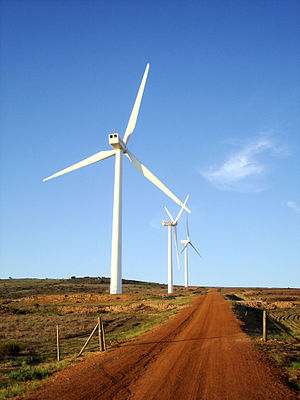Renewable Energy Independent Power Producer Procurement Programme

The Renewable Energy Independent Power Producer Procurement Programme (REIPPPP) is an initiative by the South African government aimed at increasing electricity generation through private sector investment in solar photovoltaic and concentrated solar, onshore wind power, small hydro (<40 MW), landfill gas, biomass, and biogas.[1][2] As of 2021, a total of 117 projects have been awarded to the private sector. Private sector investment totaling R209.7 billion (US$14.19 billion) has been committed to the REIPPPP, and would generate 3922 MW of renewable power.[3] The programme supports the commitments made by South Africa under the Paris Agreement as of 2018, having contributed to climate change objectives, i.e. the reduction of 22.5 million tonnes of carbon dioxide (CO2) and saving 26.6 million kilolitres of water.[4]
History
At the 2011 United Nations Climate Change Conference (COP17) in Durban, the Renewable Energy Independent Power Producer Programme (REIPPP) was introduced to implement the objectives of the Integrated Resource Plan (IRP 2010-2030),[4] of which are to diversify the country's energy mix away from fossil-fired power generation like coal and crude oil, to take advantage of opportunities relating to a Green Economy, and in creating new green industries with at least 300 000 jobs.[5][4] These projects have supplied the national grid with 56 206 GWh of renewable energy. Fourteen projects have started or are currently being built.[6] Companies are meant to submit competitive tenders and self-fund their projects to be accepted as Preferred Bidders.[4]
Following the Stage 6 load shedding crisis in June 2022, President Ramaphosa announced that Bid Window 6 will double the amount procured from 2,600 MW to 5,200 MW,[7] with 3,200MW allocated for wind and 1000 MW for Solar PV.[8] The National Planning Commission also proposed the 100 MW ceiling of private generation be removed.[9] It said solar and wind power projects can bring online 10 000 MW of capacity within 2–3 years.[9]
| Bid Window | Year | Allocated (MW) | Number of Preferred Bidders chosen | Notes |
|---|---|---|---|---|
| 1 | 2011 | 1415 MW out of 3725 MW | 28 | 18 Preferred Bidders for Solar photovoltaic (631.53 MW), 8 for Wind (633.99 MW), and 2 for Concentrated Solar Power (CSP) (150 MW). 2209 MW was available for the next windows.[5] |
| 2 | 2012 | 1033.35[10][11] | 19[2] | 7 projects with Onshore wind (555.13 MW), 9 with Solar (428.22 MW), 2 with Small Hydro (14.22 MW), 1 project with CSP (50 MW)[10] |
| 3 | 2013 | 1456 MW out of 1473 MW | 17 | Solar PV (435 MW); Wind (787 MW); CSP (200 MW); Landfill Gas (18 MW); Biomass (16 MW).[2] |
| 3.5 | 2014 | 200 MW | 2 | 2 CSP projects were allocated, each with a 100 MW capacity.[11] The first came into effect in 2016,[12] with the second in 2018. |
| 4 | 2018 | 2204.51 MW[10] | 26[11] | Minister of Energy Tina Joemat-Pettersson, announced that Bid Window 4 will be extended by a further 1800 MW to reconsider unsuccessful project bids from windows 1 to 4.[13] |
| 5 | 2021 | 2583 MW out of 2600 MW[14] | 25 | 12 Onshore wind (1600 MW) and 13 Solar PV (1000 MW) projects were allocated on the 28th October 2021.[6][15] The weighted average price of the Preferred Bidder projects, i.e. both Wind and Solar PV, was R473 (US$32) per MWh. Bid Window 5 will inject a total private sector investment of R50 billion (US$3.38 billion) into the economy, with 13 900 job opportunities. |
| Total | 8891.86 MW | 117 |
See also
References
- ^ "Renewable Independent Power Producer Programme | South African Government". www.gov.za. Retrieved 2021-10-31.
- ^ a b c "Bid Window 3 Preferred Bidders' announcement" (PDF). 4 November 2013.
{{cite web}}: CS1 maint: url-status (link) - ^ Eberhard, Anton; Kolker, Joel; Leigland, James (2014). South Africa's Renewable Energy IPP Procurement Program: Success Factors and Lessons. Washington, DC.
- ^ a b c d Radebe, Jeff. "Renewable energy independent power producer (REIPP) agreements will benefit South Africa in the transition to an environmentally sustainable economic future" (PDF).
{{cite web}}: CS1 maint: url-status (link) - ^ a b Peters, Dipuo (7 December 2011). "IPP Bids Announcement" (PDF).
{{cite web}}: CS1 maint: url-status (link) - ^ a b "KEY MESSAGES FROM THE RENEWABLE ENERGY INDEPENDENT POWER PRODUCER PROCUREMENT PROGRAMME BID WINDOW 5 (REIPPPP BID WINDOW 5) BIDDERS' CONFERENCE, HELD ON 26 MAY 2021". DMRE. Retrieved 2022-05-10.
- ^ Diemen, Ethan van (2022-07-25). "POWER CRISIS: Here it is: Ramaphosa's 'energy action plan' to end SA's rolling blackouts". Daily Maverick. Retrieved 2022-07-27.
- ^ "Government Communications gives update on procurement process for renewable energy IPP procurement programme bid window 6 | South African Government". www.gov.za. Retrieved 2022-09-12.
- ^ a b "NPC PROPOSES URGENT MEASURES TO END LOADSHEDDING CRISIS 6 July" (PDF).
- ^ a b c "IPP Projects - Project Database". www.ipp-projects.co.za. Retrieved 2022-05-12.
- ^ a b c Larmuth, James; Cuellar, Alberto (2019). "An updated review of South African CSP projects under the renewable energy independent power producer procurement programme (REIPPPP)". SOLARPACES 2018: International Conference on Concentrating Solar Power and Chemical Energy Systems. Vol. 2126. Casablanca, Morocco. p. 040001. doi:10.1063/1.5117581. S2CID 201453338.
- ^ "About us". kathusolarpark. Retrieved 2022-05-12.
- ^ "Renewable IPPPP - Bid Window 4 Preferred Bidders" (PDF). Archived (PDF) from the original on 2021-11-09.
- ^ Mantashe, Gwede (2021). RENEWABLE ENERGY IPP PROCUREMENT PROGRAMME (REIPPPP) BID WINDOW 5 (PDF). Archived from the original (PDF) on 2022-03-31.
- ^ "REIPPPP BID WINDOW 5 - LIST OF PREFERRED BIDDERS" (PDF).


